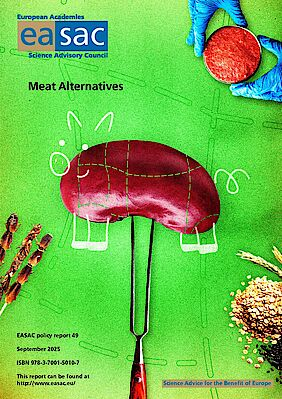The report aims to assess the scientific, technological, societal, and regulatory developments in meat alternatives defined as products (plant as well as non-plant-based) aiming at mimicking meat in terms of technical features (e.g. taste, texture, appearance) and sometimes nutritional properties. The report evaluates the following categories of meat alternatives as potential alternatives to conventional meat: plant-based alternatives, insect-based proteins, biomass fermentation products, precision fermentation products, and cultivated meat. The report was prompted by earlier EASAC work calling for a better assessment of the scientific evidence around the potential benefits and challenges of innovative foods in the context of the current climate change crisis, and its implications for health (EASAC 2019).
Key objectives of the report are as follows:
• To assess the impacts of different meat alternatives (environmental impacts of production, human health impacts of consumption, ethical impacts) compared with conventional meat production.
• To understand consumers’ attitudes and acceptance of meat alternatives.
• To identify technological and economic challenges and opportunities related to scalability, cost, and production methods.
• To review the existing regulatory frameworks and policy implications in the European Union (EU).
• To provide recommendations for improving transparency, sustainability, and responsible innovation in the sector. While several aspects of this report may have implications for human diets, it does not focus on these aspects and does not aim to provide dietary guidance.

